他のメンバー : 王 寧 岡根 泉 戒能 洋一 関堂 充 吉岡 洋輔 山岡 裕一 氏家 清和 首藤 久人 松下 秀介 松倉 千昭 菅谷 純子 石賀 康博 浅野 敦之 田島 淳史 福田 直也 有泉 亨
キーワード:食糧戦略、食糧科学、食糧安全保障
http://www.agbi.tsukuba.ac.jp/~seiken/foodsecurity/index.html
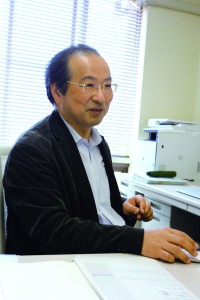 我が国の自給率は現在40%と、先進国の中では最低の水準です。自給力の向上と将来の安定した食糧供給には、現在の農業生産量の維持が不可欠となります。しかし、農業従事者の平均年齢は既に65歳を超えています。少子高齢化が進む日本の農業生産力と食糧事情はどうなるのでしょう。農業生産量を持続させるにはどんな技術開発が有効なのでしょうか。生命の根幹に関わる食糧の問題を、 数10年先を見据えて研究しているグループがこのリサーチユニットです。
我が国の自給率は現在40%と、先進国の中では最低の水準です。自給力の向上と将来の安定した食糧供給には、現在の農業生産量の維持が不可欠となります。しかし、農業従事者の平均年齢は既に65歳を超えています。少子高齢化が進む日本の農業生産力と食糧事情はどうなるのでしょう。農業生産量を持続させるにはどんな技術開発が有効なのでしょうか。生命の根幹に関わる食糧の問題を、 数10年先を見据えて研究しているグループがこのリサーチユニットです。
高齢化の進む日本で、食糧をいかに持続的に確保するか
私たちのリサーチユニットでは、社会科学者が未来の社会構造を予測し、持続的な食糧安全保障には何が必要かという事を考えます。そして、自然科学者がそ れを技術的に実現する研究開発をすすめています。例えば2050年、人口の5人に2人が65歳を超える日本の農業の基盤を考える時、私たちが着目するのは労力の負担を軽減する「らくらく農業」です。図1は開花後そのまま果実を作るトマトで、ひとの手による受粉作業がいりません。一年中温室で栽培される野菜 の場合、自然受粉が難しい時期や、暑い時期に温室での長時間の作業が厳しい事もあります。植えておいて病害対策を行えば、あとは収穫するのみという農業が実現できるかもしれません。
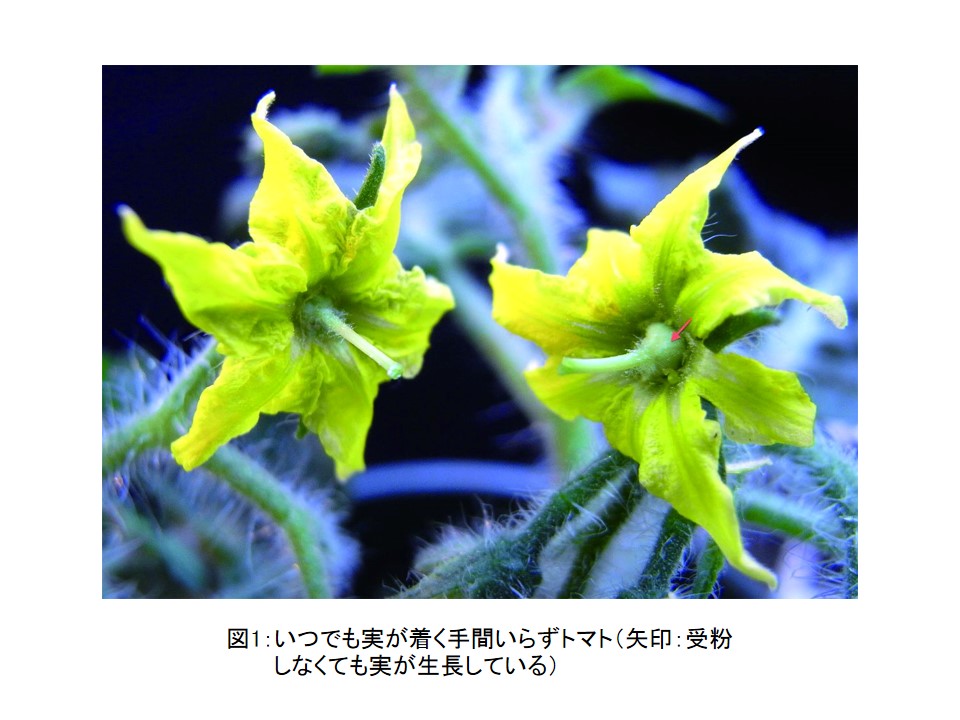
野菜の機能性を高めてその価値を高め、園芸農業の活性化に貢献します
健康的な食生活に野菜は不可欠ですが、野菜は貯蔵が難しいのが難点です。そこで注目しているのが貯蔵性を高める技術。図2のトマトは、熟してから60日間腐らない性質を持っています。この技術を他の野菜にも応用できれば、自由貿易の波に乗って他国への輸出も可能になるでしょう。また、野菜のブランド力を上げるための研究もしています。フルーツゴールドギャバリッチ(図3)というトマトの品種には、GABAというアミノ酸が多く含まれ、血圧を下げる効果があ ります。ここでは食べて健康になる機能性を高めた野菜作りを目指しています。
このように、園芸作物(野菜)生産の強化や生産技術の開発を通じて、未来の農業基盤を構築します(図4)。
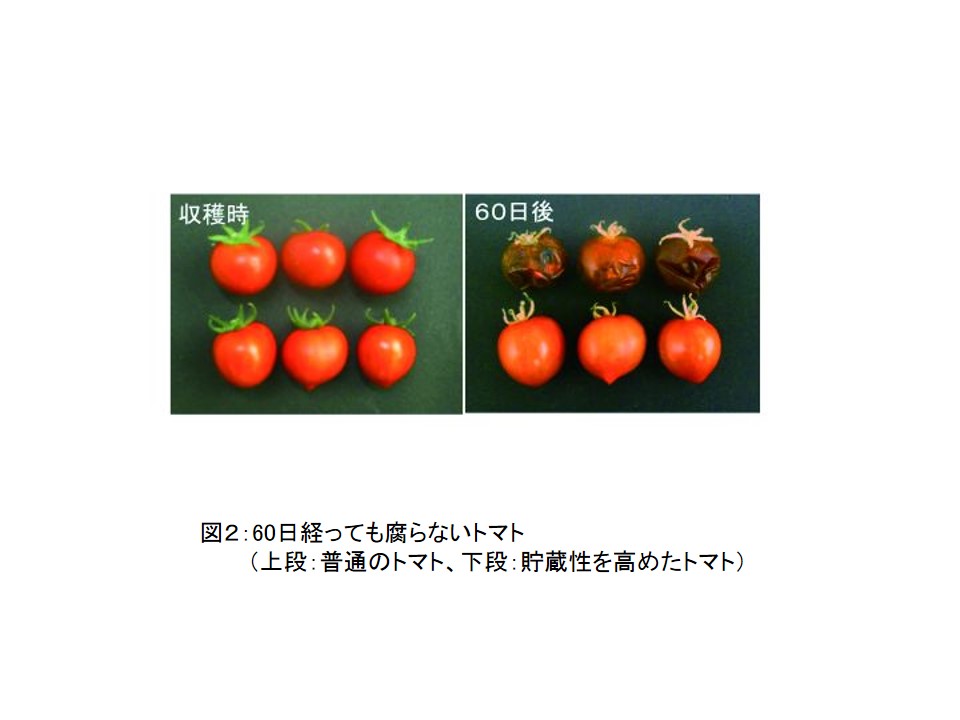
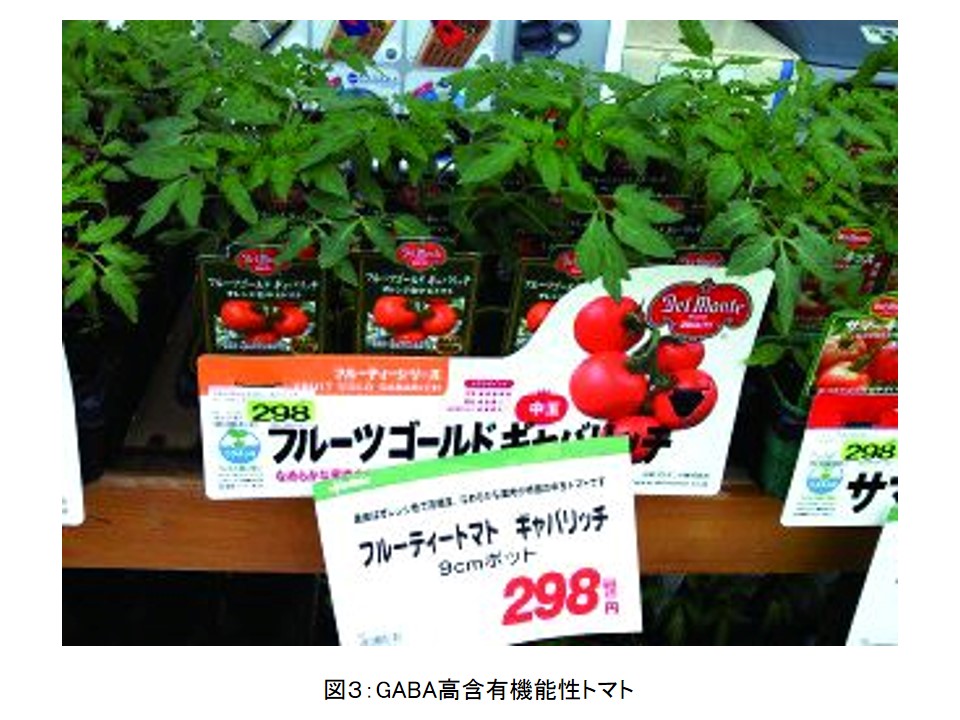
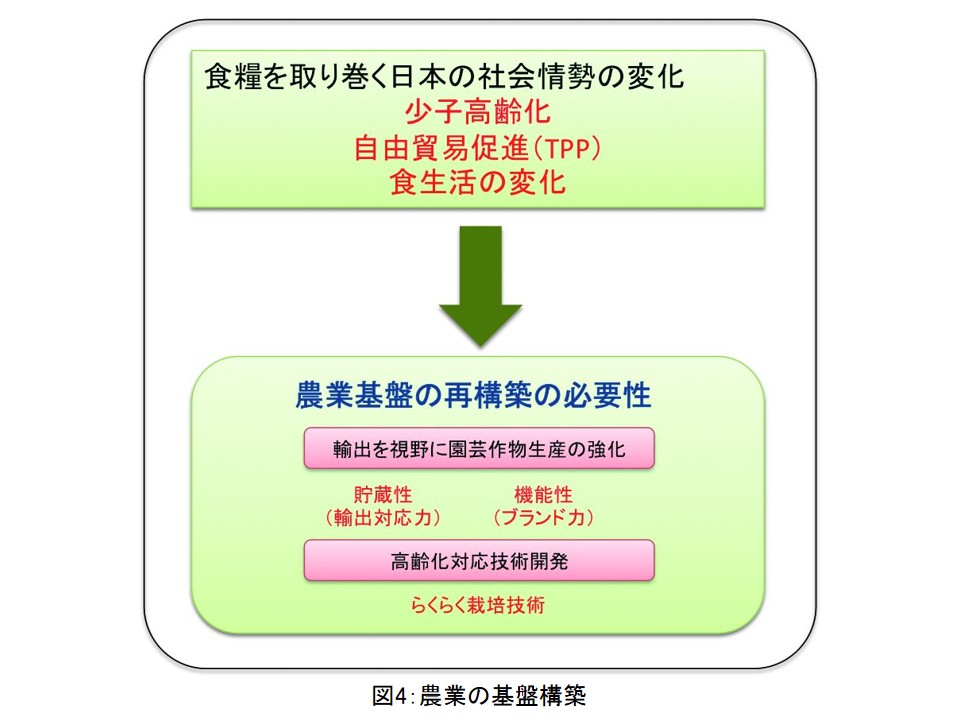
社会への貢献・実績
>● 園芸作物は筑波大、と言われるほど国内外で注目されている研究グループであり、NHKのテレビ番組にも出演
● 茨城県は日本の園芸作物の一大生産県であり、県や企業とも連携し、国内的にも希有なフードセキュリティー研究拠点を形成
● 食糧安全保障に関する教育ユニットを通じ、社会に期待される人材を育成
(取材:平成25年5月9日)
Food Security
Unit members : Wang Ning Okane, Izumi Kainoh, Yooichi Sekido Mitsuru Yoshioka, Yosuke Yamaoka, Yuichi Kiyokazu, Ujiie Shuto, Hisato MATSUSHITA, Shusuke Matsukura, Chiaki Sugaya, Sumiko Ishiga, Yasuhiro Asano, Atsushi Tajima, Atsushi Fukuda, Naoya Ariizumi, Tohru
Key words: Food strategy, food science, food security
The current food self-sufficiency rate of Japan is 40%, the lowest of all developed countries. Current agricultural production should be maintained to improve the current self-sufficiency rate and ensure  sustainable food supply in the future. However, the average age of farmers is already over 65 years. What will happen to agricultural productivity and food supply in Japan with its declining birth rate and an aging population? What technological development will be effective for maintaining agricultural productivity? Our unit investigates future food problems in the coming 10 years, which are fundamental to our lives.
sustainable food supply in the future. However, the average age of farmers is already over 65 years. What will happen to agricultural productivity and food supply in Japan with its declining birth rate and an aging population? What technological development will be effective for maintaining agricultural productivity? Our unit investigates future food problems in the coming 10 years, which are fundamental to our lives.
How should food supply be maintained in Japan with an aging population?
In our unit, social scientists predict a future social structure to consider what is needed to maintain food security. Natural scientists are engaged in research and development to technologically realize the structure. For example, we focus on “easy agriculture” to reduce the burden of labor in consideration of the agricultural situation in Japan where 40% of the population will be over 65 years old in 2050. Figure 1 shows tomatoes that bear fruits after flowering without manual pollination. Cultivating vegetables in greenhouses all year round may pose difficulties when relying on natural pollination in some seasons and prolonged working hours in greenhouses in hot weather. Agricultural processes before harvesting may be reduced to planting and disease control.

Figure 1: Tomatoes that bear fruits throughout the year (arrow: a fruit growing without pollination)
Increase the functionality and value of vegetables and activate horticulture production
Vegetables are essential components of healthy diets. However, storing vegetables is difficult. Technology to increase storage stability has attracted attention. Figure 2 shows tomatoes that do not go rotten for 60 days after ripening. If this technology can be applied to other vegetables, free trade should facilitate the export of such vegetables to other countries. In addition, we make efforts to increase the desirability of vegetable brands. The tomato cultivar the Fruit Gold GABA-rich (Figure 3) has abundant levels of an amino acid called GABA. GABA has antihypertensive effects. We aim to grow highly functional vegetables as healthy foods.
Thus, a future agricultural base will be constructed through the enhanced production of horticultural crops (vegetables) and development of production technologies (Figure 4).

Figure 2: Tomatoes that do not go rotten even after 60 days (upper: ordinary tomatoes, lower: tomatoes with increased storage stability)
Social contributions and achievements
● Our unit has attracted so much attention, both in Japan and abroad, that the University of Tsukuba is called a center of horticultural sciences and has even appeared in a television program on a state-run channel.
● Ibaraki Prefecture is a major producer of horticultural crops in Japan. Our unit collaborates with the prefectural government and companies, forming a unique food security research base in Japan.
● Human resources, expected to meet social demands, are developed through education on food security.


